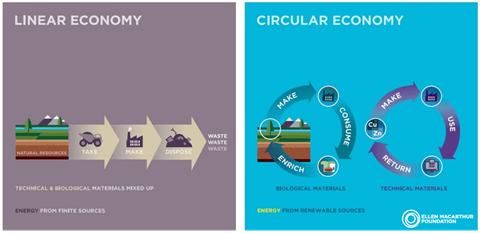Circular Economy
- Details
- Written by: Rochelle Burr Penrith City Council (02) 4732 7777 (02) 4732 7958 council@penrithcity.nsw.gov.au https://www.penrithcity.nsw.gov.au 601 High St Penrith NSW 2750 Australia

What is a Circular Economy?
Traditionally, our linear economy has been based on a take, make and waste model developed at a time of lower global populations and what appeared to be an endless number of natural resources. Over time it has become apparent that this model is no longer sustainable, and we need to look at more efficient ways of using our resources. One such way is a circular economy.
A circular economy aims to reduce waste by keeping products and materials in use for as long as possible. The circular economy is based on three principles:
- Design out waste and pollution
- Reuse products and materials at their highest value for as long as possible
- Regenerate natural systems – helping natural processes and letting nature thrive, such as improvement of green spaces, more biodiversity and better soil conditions.
The circular economy transforms our mostly linear economy into an economy that fosters innovation and productivity resulting in major economic, social and environmental benefits for Penrith. It contributes to innovation, growth and job creation, while reducing the impact on the environment.

Figure 1: Linear and circular economy model
Explaining the circular economy and how we can re-think progress is illustrated in this easy to watch animated video essay by the Ellen MacArthur Foundation.
Why a circular economy?
Transitioning to a circular economy will create several benefits for Council and the community including the creation of more jobs, increasing the accessibility of goods, reducing greenhouse gas emissions, and reducing waste. Studies have shown a circular economy has:
- an economic benefit of $210 billion to Australia’s GDP by 2050 (Centre for International Economics, Headline economic value for waste and materials efficiency in Australia, commissioned by the Department of the Environment and Energy, Oct 2017)
- an additional 17,000 full time equivalent jobs will be created by 2047-48 (KPMG, 2020, Potential Economic Pay-off of a Circular Economy).
Circular Economy Roadmap
In 2022, Council developed a Circular Economy Roadmap which identifies 4 focus areas and 18 initiatives, to ensure that Council is implementing circular economy principles and practices within our own functions and operations and is also engaging with the community and local businesses to build capacity and support actions towards transitioning to a circular economy.
Council Circular Economy Case Studies
Food Organics Garden Organics (FOGO)
In 2009, Council became the first metropolitan Council in Australia to introduce a Food Organics Garden Organics (FOGO) collection service to the urban areas of Penrith. This service was then extended to rural areas in 2019. The FOGO bin takes items such as garden vegetation, cardboard takeaway boxes, animal droppings, tissues, meat, bones, dairy and other food scraps. Collected FOGO is turned into compost before being used on local parks, gardens and sports fields.
Library
Penrith has three libraries which are free to join for residents of NSW. The library collection includes books for adults and children, DVDs, magazines, online tutoring for students, as well as eBooks and audio books.
Since 1980, the toy library has been offering inclusive play opportunities for the children of Penrith. Children can also borrow toys to take home, an easy way for families to keep up with age and developmentally appropriate toys without financial burden.
Civic Centre Refurbishment
The Civic Centre refurbishment and relocation of departments required a huge cleanout of existing spaces. To divert waste from landfill and to reduce costs associated with disposal, the Waste and Resource Recovery team placed waste sorting stations around the Civic Centre, alongside education materials, to provide convenience and thought-provoking decisions when disposing of office waste.
Surplus office stationery was made available to Council employees to give a second life to items rather than buying new. As part of the refurbishment, desk stations were retrofitted, and old desks and tables were offered to Penrith community groups and sporting clubs for free.
Sustainable Roads
In 2019, Council trialled the use of glassphalt, an environmentally sustainable alternative to the traditional asphalt. Where asphalt uses sand in the road paving mix, glassphalt uses ground glass. Approximately 50 tonnes of ground glass was used to pave Stafford Street in Penrith. After the success of the trial, Council made a commitment to use recycled glass in all future road works.
Council have since partnered with State Asphalt Services for the resurfacing of Jamison Road, South Penrith and Swallow Drive, Erskine Park with the PAK-PAVE™ road surface which includes a mixture containing almost 136,000 coffee cups. As well as the cups, the asphalt included over 1.2 million glass bottles.
Bike drop-off and Repair Event
Council hosted a free Bike Drop-off and Repair Event in May 2023. Sixty residents brought their bikes for a check and tune by Revolve ReCYCLING, saving residents money and diverting them from ending up in landfill. Unwanted bikes and scooters were donated by 150 people to charity. Revolve ReCYCLING repair and deliver the bikes to charitable causes that provide transport and recreation to underprivileged children. Any bikes that are not salvageable are dismantled and recycled. The rubber from tyres and tubes is used in playground equipment, bike lanes and in asphalt and the bike frames, melted down for their steel and aluminium to make new metal products.
What can I do?
The circular economy is about rethinking waste and changing our behaviours towards consumption and usage. You’re probably already participating in the circular economy without knowing it. Circular actions can include:
- Sharing – sharing moves from ownership to user rights, renting, borrowing and shared use. Examples include libraries, ride-sharing, streaming services, and renting equipment.
- Reusing – using a reusable coffee cup instead of disposable takeaway cups, reusable shopping bags, cloth nappies. Giving unused items away instead of putting them in landfill.
- Repairing and refurbishing – darning the hole in your sock, giving your furniture a facelift with a paint job, replacing a broken part instead of throwing the item away.
If you would like to learn more about the circular economy, further information can be found at:
- the Reuse Hub which has tips on how to reuse items
- Council’s Love Food Hate Waste page showing you how to reduce your food waste
- the Australian Circular Economy Hub’s Knowledge Hub which has great links to education and case studies of circular organisations and initiatives.
Circular Economy Resources for Business
Visit Council's Circular Economy Hub to access a wealth of resources, videos, cases studies and presentations from industry experts that delve into the core concepts of the circular economy.
